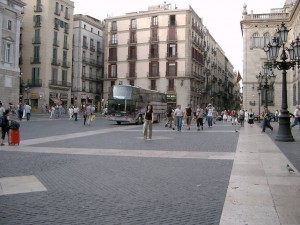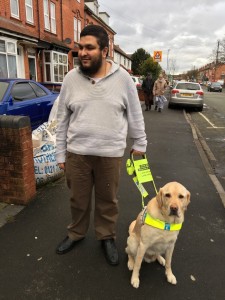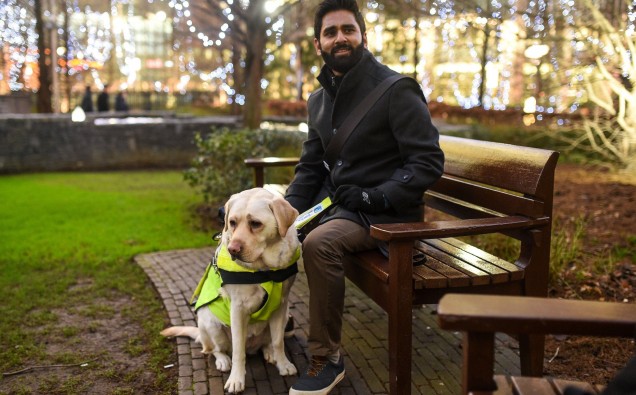There are approximately 1 million blind and partially sighted adults in the United Kingdom.
Approximately 5% of these people have no sight at all, with the remainder having varying degrees of residual sight which enables them to function visually to different degrees.
Asian World takes a look into what it means to be visually impaired in today’s Society with faith, function and freedom.
How easy is it for the vision impaired to be independent in the city?
Blind Man Uses GoPro to film daily abuse
Amit uses technology to identify the discrimination he faces every day.
Amit Patel, a former A&E doctor, who lost his sight five years ago, has highlighted his daily struggles in getting around London using modern GoPro technology.
The 37-year-old began attaching a small, lightweight camera onto guide dog, Kika’s, back in efforts to film his daily trials tribulations whilst travelling on public transport. .
Amit then uploads the footage onto a computer where it is then reviewed by his able-sighted wife, Seema, who helps to identify moments where Amit was ignored or abused.
 Commuters were filmed barging past, as well as remaining seated in carriages were Amit was standing with kika. People were even caught hitting him with their umbrellas and bags in efforts to move him aside.
Commuters were filmed barging past, as well as remaining seated in carriages were Amit was standing with kika. People were even caught hitting him with their umbrellas and bags in efforts to move him aside.
“It all started when people barged me out of the way [on the escalator],” he said.
“They have loads of space to get past, but they seem to think it is fun to barge into a blind person.
“Kika always sits to my left hand side so we often block the escalator, and people will hit her with bags and umbrellas to get her to move out of the way.
“The worst part is the tutting and negative comments behind me. People are so rude and arrogant and assume they can do whatever they want.”
Amit explains that he was even ordered to apologise for ‘holding people up’ on the escalators.
“One lady even said I should apologise to the people behind her for holding them up. I asked her if I should apologise for being blind and she said “yes”.’
“It really scares Kika sometimes. I can feel how upset she gets, and when I get upset she senses it as well – and she won’t go on the escalators for a few days.”
Travel is an everyday part of Amit’s life. He often commutes on Southeastern trains to London Bridge, and then on the London Underground.
“People just don’t care,’ Amit continues. ‘They assume I’m going to take up the whole carriage.
“Sometimes I get a train with my four-month-old son and I say quite loudly, “Kika, find me a seat”, but no one budges.
“When my wife reviewed a piece of footage once, a lady was sitting on a seat and had her shopping on the one next to her.
“Sometimes the only way I get a seat is to scratch Kika behind the ears so she shakes a little. No one likes a wet dog.”
“People even walk right up to me but then swerve at the last minute. They also come up to Kika and touch her and distract her while she is walking, which puts her off.”
Amit’s is heavily reliant on Kika, he explains how the specially-trained dog once saved his life when a car ran a red light at a crossing in Lewisham.
“She saw the car and she got in front of me and took the hit,’ he said. ‘The car grazed her nose. It was three days before she could work again.”
Amit is now an active volunteer with RNIB, Action for Blind people and Guide Dogs for the Blind, where he helps coach people who require the assistance of guide dogs.
‘Losing my sight was very lonely,’ Amit said. ‘If I’m travelling by public transport, I’m sometimes like a scared little boy sat in the corner.’
Stripping Independence through Shared Space Schemes?
Visually impaired individuals are finding it more and more difficult to manoeuvre independently, after the government introduce the new shared space scheme.
The street panning ideas, which have been implemented in the UK, involve removing definitive roads and pavements as well as taking out crossings, road markings and curbs on the principle it creates a safer road environment through raising awareness, creating a ‘shared space’ for cyclists, pedestrians and drivers.
 It was hoped that the open environment would make pedestrians and road users behave more considerately, as the removal of barriers is said to increase the caution of road users.
It was hoped that the open environment would make pedestrians and road users behave more considerately, as the removal of barriers is said to increase the caution of road users.
But with eye contact playing such a crucial role in the shared space scheme, how does this affect the blind?
The plans have been heavily scrutinised by committees for directly impacting the mobility of partially sighted pedestrians and has proven controversial due to claims that it excludes vulnerable road users.
Tactile surfaces, like corduroy and blistered paving, are an essential tool in aiding blind people as they indicate the approach of roads, stairs and crossings. With the changes being made in highly accessible places such as city centres, partially sighted are finding it more and more difficult to maintain independence without the use of guidance aids.
Anti-shared space campaigners recently received a blow after losing a court case on a Reading scheme, where the borough council switched off traffic lights in the St Mary’s Butts, Broad Street, Oxford Road and West Street crossing in January 2015.
Simon Goodall, who represented ParalympicsGB at London 2012, argued that the decision by Reading council had placed him and other disabled people at risk.
It seems, in hopes of creating a more accessible environment for those who may physical impairments and have difficulty mounting curbs, that the road plans have isolated another demographic, one that need considerable care.
Overcoming Cultural and Religious Stigmas
Guide dog owners not only face difficulty in crowds and public places, they also experience stigmas within their communities and faiths.
Often visually impaired people, who are reliant on assistance dogs, can feel isolated from faith organisations and collective prayers, due to the attitudes of the community and stigmas around the cleanliness of the animals.
Mohammed Rashid explains what it’s like to be a Pakistani Muslim with a guide dog.
Mohammed Abbas Rashid
36 years old
Birmingham born and raised
Blind since birth
 “I have never had any sight. I can only see light, dark and shadows. I’ve been through the specialist education system, I’ve got my qualifications and I have worked for the Department for Work and Pensions in the past. I’m an avid volunteer with guide dogs and I’m a recent recipient of the Annual Guide Dog Volunteer award for 2016.
“I have never had any sight. I can only see light, dark and shadows. I’ve been through the specialist education system, I’ve got my qualifications and I have worked for the Department for Work and Pensions in the past. I’m an avid volunteer with guide dogs and I’m a recent recipient of the Annual Guide Dog Volunteer award for 2016.
Before I had a guide dog, I was afraid of dogs myself, having not been brought up around dogs. Religion wasn’t a barrier for me; it was more of a cultural barrier with people making out to me that it was wrong for religious reasons.
I heard about a case of a gentleman in Leicester, who was the first blind person who was able to take his guide dog to a mosque. They put a pen up for him were the shoes were kept and he didn’t go past that point.
Off the back of that there was a fatwa released by the Islamic Council of Britain and a couple of other mosques. I did my own research about what Islam says about having assistance dogs, and after speaking to various Imams, I discovered there is nothing wrong with having a guide dog in Islam.
I had to overcome the barrier of my family first. My wife was a huge barrier for me, she literally said ‘It’s me or the dog’ because she was from Pakistan cultural issues were prevalent and she didn’t have the knowledge that I had acquired.
Guide Dogs for the Blind left me with the correct literature and a DVD translated into several different languages and it showed individuals going into different places of worship. She then realised that later on it would alleviate her pressure so she said to me ‘I realise you need a guide dog and I support you.’
My sister, on the other hand, was always afraid of dogs but she was very supportive of me. Having two sons that were blind also, she saw their future in me, so she supported me and spoke to family.
Taxi drivers are a big issue for me and my guide dog and I’ve been a victim of disability hate crimes in public places, especially in majority Asian areas. Sometimes they just don’t let me in to shops with my guide dog.
However, my local mosque have been great, a kennel has been placed in the car park so I can make my way to prayers with my dog. They were very supportive of the idea.
There are still barriers, my family haven’t accepted it, but I’ve nearly had my dog for 3 years now and I’m really happy, he’s given me back my independence and my eyesight. This is why I want to educate the Asian community, and let them now that visually impaired people need their guide dogs to integrate with society.
My guide dog, Solo, has helped me to achieve so much, and I’ve become so attached. He’s 7 now but I’ve had him since he was 4 and we’re like best friends now.
Recently he was unwell and I missed him so much because I had to use the white cane, and now when I use my cane to go anywhere I drag my feet and walk really slow. With him I’m so confident, I just charge down the road.
He’s a highly-trained dog and has had intense training since he was a puppy. I put my full trust in him.”

























